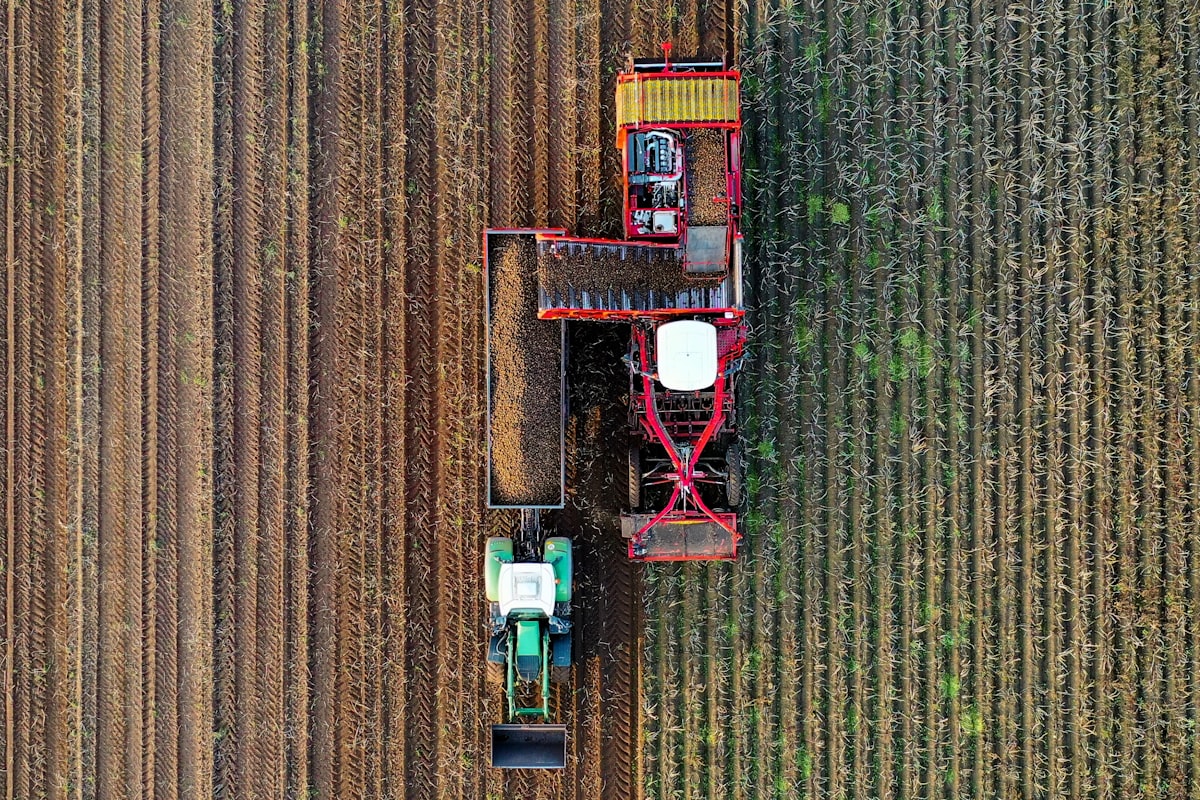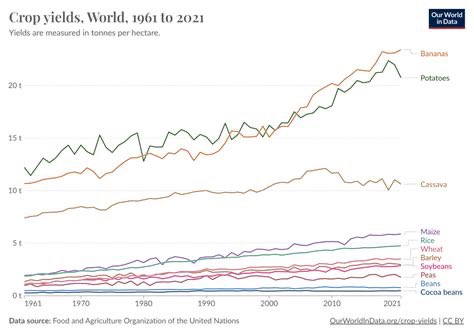What Farmers Say About Climate Change
This is probably the most honest assessment of the current state of farming and our future food supply.

People seem to misunderstand the connection between atmospheric CO2, climate predictability and industrialized agriculture. The number of times a "climate skeptic" has told me "plants love CO2", like that fixes everything, is dumbfounding.
True: plants love CO2.
Also true: plants love warmth and water.
Also, also true: it's not the CO2 (aka "plant food") itself that's the problem. It's the resulting changes caused by rapidly rising atmospheric CO2 levels. Too much climate unpredictability, weather variability, heat, drought or water will destroy agriculture. That means shortages and famine.
Civilization is built off the back of agriculture. And agriculture requires a foundation of predictability and good soil. Without predictability, agriculture isn't sustained and we once again become a species of hunters, foragers and nomads. While that worked 10,000+ years ago, the human population today is far too large and we would soon starve.
Climate change may push wild plants into areas in which they don't currently flourish, but this has nothing to do with our ability to sustain an 8 billion population with industrialized agriculture. There is a reason why farming is concentrated in certain regions of the world: good climate and good soil.
The new areas in which plants may flourish aren't necessarily ideal for growing fields of wheat, soy or corn. Even if they were ideal, it would take a significant amount of time to a) confidently identify these areas and b) build the necessary infrastructure.
If given a century or two, perhaps we could adapt to a changing environment. Unfortunately, the current pace of change risks multi-breadbasket failure in the near future.

"But food production is at record levels", is another favorite response by deniers, often sharing the chart below.
In my humble opinion, this is simply a failure of logic. Rising temperatures will affect industrial agriculture in the future, not the past.
The world is just breaking through the 1.5 degrees threshold right now. Why would we see anything but rising yields in the past - especially with technological advances in fertilizer, seeds and machinery? During the 20th century, the stars were aligned for global agriculture. The climate was ideal and innovation expanded yields.
The future is what we should worry about, as the climate becomes more unpredictable and soil quality is deteriorated.

But who am I to say? Let's see what the people feeding the world - farmers - think.
A couple months ago I asked home gardeners if they were impacted by climate change. Today, I asked professional farmers the same thing. These are the folks who are at the front lines of the climate crisis and the foundation of civilization.
This is probably the most honest assessment of the current state of farming and our future food supply. What's anecdotal today becomes empirical tomorrow.
Below, I've shared a selection of verbatim responses from farmers when asked if climate change is affecting them:
"Used to have frost in early September. Now it happens in mid-October. We had an extended warm/dry spell in May, good for fruit crops. Then it pissed rain in August, not so good for hay. Climate change will increase production around here, but it's happening so quickly I'm concerned."
"Hotter, drier summers and warmer, also drier winters. Stuff is absolutely out of whack."
"We hit 71° in February in WISCONSIN!! We might have had like a week of actual winter and then now it’s feels like spring again. We had our shortest mud season ever… mid-Jan when it’s supposed to be mid-winter. Now we are seeing things growing and coming alive… I see us cutting our rye grass Mid April this year and putting corn in late April."
"We are in Wisconsin too. If we don't lose our apple crop, I will be shocked."
"Something I wouldn't have thought of is that smoke (from wildfires) keeps hay from drying as quick."
"We saw it 25 years ago in South Africa already with increasingly hotter and drier summers. Here in western France, we are now experiencing a dry period in mid to late spring, which means we have to water crops just after sowing/planting out. Something we did not have to do before. Summers are either incredibly wet or searingly hot and dry (the latter is new for us in Brittany). With the warming ocean, we are also experiencing stronger and more frequent damaging storms."
"We've had 6 dry summers in a row in Finland. 2-3 bad harvests in that period. Winters have been warmer and shorter, but snowy still. Spring and autumn haven't really changed, only gotten longer."
"My grass grew during the winter this year so the herd grazed a little fresher, I suppose. They also got the worse lice I have ever had because of the humid and warm winter."
"Yes, our frost risk in spring is waaaay higher than normal and when it's bad, it's real bad. Basically earlier warm temps that don't stay warm."
"I think as long as it stays warm (which it’s trending that way), we will be fine. The problems occur when we get really warm then back cold again."
"I'm not a farmer. I just have a very small hobby farm in Maryland, USA. I have bees and fruit trees and grow grass to feed my animals. Winter of 22/23 was not as cold as normal and I (and others in my local bee club) noted infestations of small hive beetle during summer of 23 when in the past I had none. We think the milder winter did not kill off the hive beetles. Then the expected slowdown of available nectar in late summer seemed longer than the past years. I only had 4 hives and lost 2 outright. And combined my last two and then fed them through the winter."
"Our orchard has become completely hit or miss for fruit because of this."
"It's becoming unsustainable. Without insurance, we would be done."
"Total loss last year. The only fruit that survived was a broken branch insulated by snow. Drought and low yield the three years before that."



